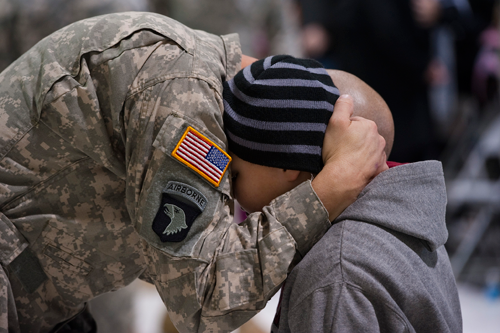
We thank them for their service in airports and bus stations, from podiums and in TV commercials. But far too many combat veterans feel not just unappreciated but rejected and abandoned and despised.
Fully one-third of the adult homeless in the US are veterans. Veterans have higher rates of alcoholism, drug addiction, and unemployment than those who never served, and they are incarcerated in numbers that are disproportionate to their share of the population. According to a 2005 study, the marriages of combat veterans are 62 percent more likely to end in separation or divorce. Their health is worse, too, both because of the long-term effects of wounds and radiation and chemical exposure during their service, and stress and substance abuse after. More than 6,500 US veterans kill themselves every year—more than the total number of US combat fatalities in Iraq and Afghanistan over the past decade.
“Warriors return transformed, both wounded and enlightened, displaced and confused regarding civilian life. They also return matured, skilled and experienced in the ways of surviving in hell. Every aspect of their functioning—mental, physical, emotional, spiritual—operates differently, according to warrior and war zone survival needs.”
“Warriors return transformed, both wounded and enlightened, displaced and confused regarding civilian life. They also return matured, skilled and experienced in the ways of surviving in hell. Every aspect of their functioning—mental, physical, emotional, spiritual—operates differently, according to warrior and war zone survival needs. They essentially come home as different people than they were when they left us. In the core sense of the term, they have been initiated; their old self has died and a new self has emerged.”
We not only put them in harm’s way, we expect them to kill on our behalf. Many soldiers are haunted by their victims for the rest of their lives, especially when they feel that they spilled their blood for no good reason.
As ancient as PTSD may be (as Tick points out, Ajax and Achilles in The Iliad suffered from it, as did King Saul in the Bible), it is not inevitable. As part of his research into the stresses experienced by Vietcong veterans with Agent Orange disabilities, Tick reports, Dr. Le Van Hao of the National Institute of Psychology in Hanoi conducted interviews with twenty-seven veterans in 2005. Their average age was 61; their average length of time at war was 11 years. Eighty-one percent of their children suffered from Agent Orange-related diseases, disabilities, or deaths. Yet none of them appeared to suffer from PTSD.
Part of this, Tick suspects, is because they perceived themselves to be defenders rather than aggressors. And part of it is because they were received by “welcoming and tending communities upon return,” who helped them reintegrate into a population that shared the wounds of war. “I never thought I was fighting Americans,” one Vietcong veteran told him. “All we did was fight invaders. That is why we do not suffer your psychological wounds.”
When survivors voice their stories before witnesses, their hearts re-open. When we identify the wounds in the stories, we can identify the remedies needed to heal.
“When survivors voice their stories before witnesses,” Tick adds, “their hearts re-open. When we identify the wounds in the stories, we can identify the remedies needed to heal.”
If we truly want to do justice to our veterans, Tick concludes, we need to “embrace their witness, tend their wounds, and share their burdens.” More than that, we must demand that our military “model and fulfill the spiritual warrior ideal” and that “our politicians….so honor it that they would never misuse or betray it.”
Humanity has fought some 14,600 wars in its 5,600 years of recorded history. If combat initiates the warrior into hell, his “journey ends,” in the words of Greg Walker, a Green Beret, “when he becomes a healer.”
Society betrays its veterans in many ways—by sending them into unjust wars and then scapegoating them; by denying them the material, medical, psychological, and spiritual support that they need.
A society that betrays its warriors also betrays itself. In that sense, PTSD is an affliction that affects us all. “As the individual warrior carries the wound of the nation,” Tick writes, “restoring our warriors and their truth restores the nations and planet.”
Click here to find out about Rose’s thoughts on wellbeing and health



